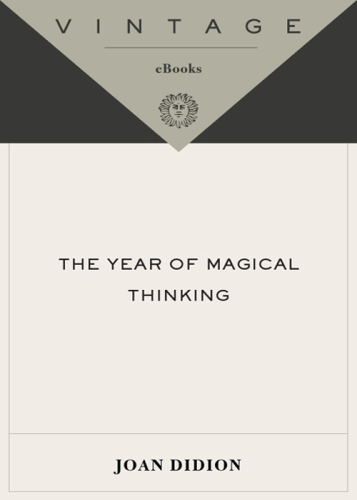
The Year of Magical Thinking
کتاب های مرتبط
- اطلاعات
- نقد و بررسی
- دیدگاه کاربران
نقد و بررسی

December 5, 2005
After her husband's fatal heart attack, which came at a time when their daughter Quintana was in intensive care for complications after pneumonia, Didion was labeled "a pretty cool customer" by a social worker because she seemed to be handling these shocks so calmly. Caruso's reading certainly reflects this aspect of Didion's reaction—sometimes her clear, elegant voice seems downright cold, making the listener wish for a little more emotion. The slightly eerie sounds of bells and cello that swell in at occasional breaks in the narration help in this respect, but mostly the audiobook is as straightforward a production as Didion wanted her life to be in that horrible year. Throughout those months, Didion immersed herself in the literature of grief and quotes frequently from poets and writers who helped her come to terms with her pain. Caruso does a good job with these passages, lingering on and highlighting certain phrases that Didion returns to time and again, shifting their meaning slightly as she progresses. Despite trying to write in an almost clinically detached way, Didion's sorrow and anger do break through at times in the book. Unfortunately, Caruso's cool reserve never cracks, so this audio ends up making less of an impact than the National Book Award– winning print edition. Simultaneous release with the Knopf hardcover (Reviews, June 27)

Starred review from June 27, 2005
Many will greet this taut, clear-eyed memoir of grief as a long-awaited return to the terrain of Didion's venerated, increasingly rare personal essays. The author of Slouching Towards Bethlehem
and 11 other works chronicles the year following the death of her husband, fellow writer John Gregory Dunne, from a massive heart attack on December 30, 2003, while the couple's only daughter, Quintana, lay unconscious in a nearby hospital suffering from pneumonia and septic shock. Dunne and Didion had lived and worked side by side for nearly 40 years, and Dunne's death propelled Didion into a state she calls "magical thinking." "We might expect that we will be prostrate, inconsolable, crazy with loss," she writes. "We do not expect to be literally crazy, cool customers who believe that their husband is about to return and need his shoes." Didion's mourning follows a traditional arc—she describes just how precisely it cleaves to the medical descriptions of grief—but her elegant rendition of its stages leads to hard-won insight, particularly into the aftereffects of marriage. "Marriage is not only time: it is also, paradoxically, the denial of time. For forty years I saw myself through John's eyes. I did not age." In a sense, all of Didion's fiction, with its themes of loss and bereavement, served as preparation for the writing of this memoir, and there is occasionally a curious hint of repetition, despite the immediacy and intimacy of the subject matter. Still, this is an indispensable addition to Didion's body of work and a lyrical, disciplined entry in the annals of mourning literature. Agent, Lynn Nesbit. 60,000 first printing; 11-city author tour.

Starred review from September 1, 2005
In her latest work of nonfiction, essayist, novelist, journalist, and screenwriter Didion ("Slouching Towards Bethlehem") chronicles the grief she suffered at her husband's passing. John Gregory Dunne's unexpected death of cardiac arrest in the winter of 2003 ended a marriage of nearly 40 years, and Didion examines her complicated responses to that loss, which included subtle forms of denial, illogical guilt, and a drive to get the facts of his passing absolutely straight. Her grieving process was interrupted and magnified by her daughter's concurrent struggle with a life-threatening illness. This book was started nine months after John's death and after their daughter's recovery, but before Didion was able to move past these traumatic events and continue with her own life. Consequently, the predominant atmosphere is one of authentic suspense that makes for a remarkable page-turner. As always, Didion's writing style is sheer and highly efficient. Strongly recommended for all libraries. [See Prepub Alert, "LJ" 6/1/05.] -Maria Kochis, California State Univ., Sacramento
Copyright 2005 Library Journal, LLC Used with permission.

Starred review from August 1, 2005
Didion--a master essayist, great American novelist, and astute political observer--uses autobiography as a vehicle for tonic inquiries into both the self and society. In " Where I Was From" (2003), she meshed family history with an examination of America's romance with the West. Here, in her most personal and generous book to date, she chronicles a year of grief with her signature blend of intellectual rigor and deep feeling. The ordeal began on Christmas 2003 when Didion and her husband, the writer John Gregory Dunne, learn that their daughter, Quintana Roo, is in intensive care with severe pneumonia and septic shock. Five grim days later, Dunne and Didion come home from the hospital, sit down to dinner, and Dunne suffers "a sudden massive coronary event" and dies. Married for 40 years and sharing a passion for literature, they were inordinately close. But Didion could not give herself over to grief: Quintana's health went from bad to worse as she developed a life-threatening hematoma on her brain. She survived, and Didion had the wherewithal to cope: "In times of trouble, I had been trained since childhood, read, learn, work it up, go the literature. Information was control." So she researches grief, schools herself in her daughter's medical conditions, and monitors the flux of flashbacks and fears that strobe through her mind. Didion describes with compelling precision exactly how grief feels, and how it impairs rational thought and triggers "magical thinking." The result is a remarkably lucid and ennobling anatomy of grief, matched by a penetrating tribute to marriage, motherhood, and love. (Reprinted with permission of Booklist, copyright 2005, American Library Association.)

























دیدگاه کاربران